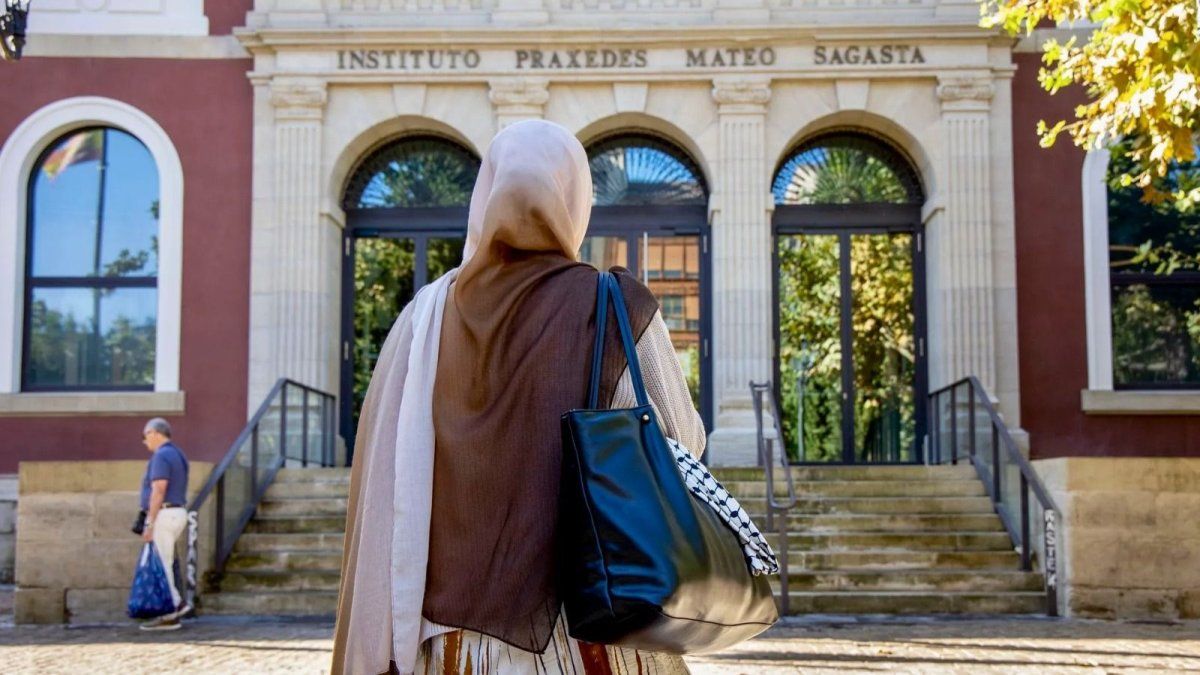An Argentine flag taking over one of the headquarters of the San Sebastian International Film Festival and at least a hundred workers from the audiovisual industry escorting her. “United Argentine cinema“, was read on the white stripe and summarized the position of the national representatives who competed in one of the most prestigious Spanish-speaking events in the sector. After the photo, the statement arrived: “deep concern for the statements of the Presidential candidate of a match far right that threatens the closure of the National Institute of Cinema and Audiovisual Arts (INCAA)”.
“We are going to close it, just like the Public Televisionlike Telam“he promised Javier Milei in a television interview, where he said that the stimulus programs for national productions constitute “privileges“and that the cultural investment “it generates a deficit. If it generates a deficit, it is because you do not generate a product that is palatable to the market. Under normal conditions you should not exist.”
“In strictly economic terms, every peso invested in promotion of audiovisual generates a multiplier effect on the economy“he explains to Ambit the film director and president of the INCAA, Nicolas Batllewho adds: “Cinema is art and industry. A great generator of work since 80% of the cost structure of a film are human Resources”.
The institute itself made public a study of its observatory where it states that the registered private employment in the sector grew by 45% between 2007 and 2022, with a period of decline determined by state disinvestment: 2016-2019. In recent years, due to technological convergenceits integration projections with the video game sectorits ability to transnational export and the potential to generate added value, the audiovisual activity was included as Knowledge Economy.
One of the recurring doubts about the INCAA It is your financing method. Although there are budget items for the National Treasurethe main source of financing is stipulated by the Law No. 24,377 known as the “film law“, which proposes a 10% tax on the price of cinema tickets and a percentage of the collection of the ENACOM on the billing of TV channels and cable services. In short: those who consume it pay for cinema.
Still recognizing it as a dynamic sector of the national industry -which contributes 5.2% to the Argentine economycontemplating the direct and indirect effects on other items, such as tourism and the gastronomy– the intangible benefits of cultural investment They have no concrete possibility of measurement. “The possibility of having one’s own culture, a own cinema, a mirror to look at ourselves. The right to tell our own stories. Culture is not an expense, it is an investment“, points out Batlle. A concrete example is the platform Cine.armanaged by INCAA and pioneer of on demands free distribution of national productions, a right that most countries in the world do not have.
Nicolás Batlle INCAA
Nicolás Batlle, director of INCAA.
He federal rootsthe heterogeneity of the promotion programs (for municipalities, private foundations or universities), and the capacity to attract investments international platforms represent opportunities for the sector which, in turn, allocates funds for first audiovisual productions. That was the case of Camila Fabbriwriter, theater director and actress, with recognition in the Argentina and abroad, which premiered “Clara gets lost in the forest” in it San Sebastian International Festival in his first job in film direction.
“He INCAA He offered almost 100% support for the making of my film. We also have a patronagewhich was a support of State. It was my first film and it was made with those two supports. It is a purely Argentine production,” he maintains. Fabbri for this medium and assures that “If these two entities disappeared, obviously this film would not exist“.
Furthermore, the director highlighted that during filming they called “a lot of workers and they all have blank contracts thanks to the Argentine Film Industry Union (SICA)just like the actors who have their union.” “It is a tangible gain because there are labor contracts that end with one shoot, but then another begins and there is another shoot. Most of them live off of that. cinema workers“he details.
International projection of Argentine cinema
This year, the national public once again focused its attention on the ceremony of the Oscar awards. The latent possibility that “Argentina, 1985” was elected as Best Foreign Language Film repositioned the national cinema on the main stage of the global audiovisual industry. Although this production ultimately did not receive the Oscar, Argentina continues to hold a privileged place: it is the only Latin American country that has won the statuette on two occasions, with “The official story” and “The Secret in Their Eyes”.
“I think there is no doubt about the power and creativity that our cinema. The participation of our films in the main festivals in the world certifies this. More than fifteen films in the San Sebastian Festival this year. We also had very good participation in Cannes, Biarritz, Sitges. He INCAA “It represents an incentive for creators to create their works and for them to reach the public,” he highlights. Nicolas Battle and notes that “for the second consecutive year the national animated cinema was present at the Annecy Festival and its market MY FA”.
According to the president of INCAAthe organism “was always the talent hotbed” and lists the different stimulus and financing programs: short film competitions, debut feature competitions, federal project competition, the eight national headquarters of the National School of Film Experimentation and Production (ENERC).
“It is about promoting the strong emerging talent that our country has in audiovisual terms,” he remarks. Batlle and points out “that the provincial and municipal incentives through the systems cash rebate either tax rebatewhich make possible, often combined with national fundsgenerate a competitive industry”.
Argentina at the San Sebastian Festival
As usual protagonists of San Sebastian International Film Festival, the Argentine delegation once again exposed the narrative potential of its productions. The fifteen projects represent a record number of participation in the 71st edition of one of the most prestigious competitions in Spanish-speaking cinema. In this context, the award ceremony was also dyed white and light blue: the film “Puan” (directed by Maria Alche and Benjamin Naishtat) won in the category best screenplay and best Actor (for the leading role of Marcelo Subiotto) and the film “the castle” (whose director was Martin Benchimol) took the award in the category Latin Horizons.
Camila Fabbri

Camila Fabbri during the filming of “Clara gets lost in the forest”.
Photo: Alina Films.
He also participated in that selection “Clara gets lost in the forest“, of Camila Fabbri. “Adulthood has a parallel with being lost in the forest, which is a place that appears to keep you safe because it is in nature but it is also a space that can resemble that break from the past and the adolescence“, explains the director about the plot of the movieand adds: “The idea of getting lost in the forest is a kind of metaphor for not being very clear when one ends up finding oneself.”
On the responsibility of facing a debutindicated that “I assumed the role of directing a movie as at the time I assumed the role of directing a play” and recognized that “although they are two very different worlds, there is something about having gone through the direction of almost four plays that I think helps a lot when facing a filmingespecially for the work with the actors and actresses, which is the biggest responsibility that I took on in this film in which I had a very efficient and wonderful team.”
For the story, which tells the motherhood process of a survivor of the tragedy of Cro-Magnon -theme that Camila Fabbri addressed in his book “The day they turned off the light“-, the director explained: “I did not have to immerse myself in those images again, or at least not in a dark and painful way as if it were perhaps the book project. The assembly of the script for this movie It had to do more than anything with getting into the present of being a woman in her thirties who wonders things about life. maternity and his economy as a single woman and about a very big wound that remained from the past.”
Source: Ambito
I am an author and journalist who has worked in the entertainment industry for over a decade. I currently work as a news editor at a major news website, and my focus is on covering the latest trends in entertainment. I also write occasional pieces for other outlets, and have authored two books about the entertainment industry.




